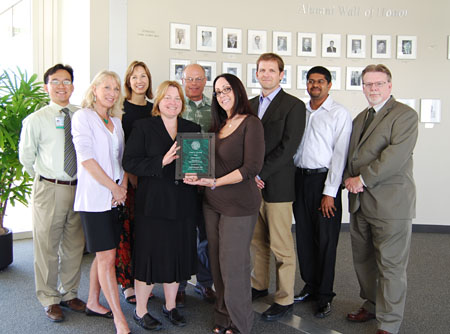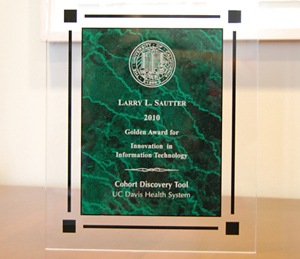
Team members pictured left to right: Hien Nguyen, Julie Rainwater, Este Geraghty, Deborah Lee, Larry Errecart, Davera Gabriel, Kent Anderson, Ayan Patel and Michael Minear. Not Pictured: Daniel Cotton, Christopher Lambertus, Stuart Henderson, Teresa Porter, Carol Christensen and Lars Berglund.
Posted Aug. 18, 2010
Cohort Discovery, a powerful new computer program developed at UC Davis Health System, has been selected by the UC Office of the President to receive a 2010 Larry L. Sautter Golden Award for Innovation in Information Technology. The award was presented in July at the UC Computing Services Conference in Los Angeles.
The innovative program enables researchers to more efficiently identify potential research subjects using custom-designed software that performs real-time queries and allows searches for specific demographic characteristics and diagnoses. The new tool allows researchers to access de-identified individual data — information that has been stripped of important identifiers to protect privacy such as an individual’s birth date, gender and address — from electronic health records.
“The ability to search patient data for research-study cohorts is challenging, given the restrictions of the Health Insurance Portability and Accountability Act and other privacy requirements,” said Kent Anderson, research technology manager and co-director of biomedical informatics for the UC Davis Clinical and Translational Science Center. “Cohort Discovery addresses this problem by allowing researchers to easily access large, intricate patient datasets, making the process of designing research studies and generating hypotheses more efficient and comprehensive.”
As Cohort Discovery continues to be developed and refined, it has the potential to significantly advance clinical-trial recruitment and improve health-care research, from studies that reduce health disparities to ensuring that new treatments quickly reach patients who need them. The health system has approximately 70 researchers actively using the program and is training nearly a dozen more each month.
 “Both the Computerized Provider Order Entry and Cohort Discovery projects were demanding and consisted of very sophisticated software and data elements. They could be accomplished only through a deep and committed partnership of many faculty and staff.”
“Both the Computerized Provider Order Entry and Cohort Discovery projects were demanding and consisted of very sophisticated software and data elements. They could be accomplished only through a deep and committed partnership of many faculty and staff.”
— Michael Minear
One physician, for example, used the application to identify treatment trends that could help improve long-term diabetes control. The Cohort Discovery software allowed a sophisticated search of de-identified patient data to pinpoint instances where physicians adjusted medications in response to elevated blood glucose levels. The resulting information ultimately could be used to conduct a formal study that might identify barriers to successful diabetes self-management.
Scientists also are using Cohort Discovery to assess whether there are sufficient numbers of prospective research subjects within an electronic medical records system to conduct a particular study. The new software enables this preliminary research process to be both more efficient and more protective of individual medical records.
“Cohort Discovery improves on patient privacy because researchers now have a robust and secure system to perform routine data screenings and hypothesis-validation studies without ever having to view protected health information,” said Anderson. “It enables researchers to fine tune their prospective study targets as work their way through the research approval process.”
The software behind Cohort Discovery is part of a National Institutes of Health-funded initiative called “Informatics for Integrating Biology and the Bedside” (i2b2). Partners HealthCare initially developed the software. The NIH funded the conversion of the software to open source, making it available to other universities without software licensing costs.

2010 Larry L. Sautter Golden Award for Innovation in Information Technology
UC Davis Health System was among the first institutions outside of Harvard to deploy the software and to convert and load patient data from electronic health records. As part of an academic users group, the health system is sharing its software and methods for Cohort Discovery with other institutions, including other UC campuses. It is also working with investigators from the University of Washington and UC San Francisco to enhance the i2b2 software to support cross-institution research efforts.
The Sautter Award Program was established in 2000 to encourage and recognize innovative information technology projects that help support the university’s mission.
The Golden Award is the second in as many years for the health system’s Information Technology department. In 2009, the department was honored for its Computerized Provider Order Entry (CPOE) project, a new system for physicians and pharmacists to use when ordering everything from medications and diagnostic tests to medical procedures and hospital discharges.
“Both the Computerized Provider Order Entry and Cohort Discovery projects were demanding and consisted of very sophisticated software and data elements,” said Michael Minear, chief information officer for the health system. “They could be accomplished only through a deep and committed partnership of many faculty and staff. Our winning these awards highlights our health system’s strengths — partnership, teamwork, commitment to excellence and addressing tough challenges.”